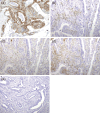Impact of vascular endothelial growth factor receptor 1, 2, and 3 expression on the outcome of patients with gastric cancer
- PMID: 19068081
- PMCID: PMC11159319
- DOI: 10.1111/j.1349-7006.2008.01020.x
Impact of vascular endothelial growth factor receptor 1, 2, and 3 expression on the outcome of patients with gastric cancer
Abstract
Tumor angiogenesis is a multistep interactive process in which vascular endothelial growth factor (VEGF) and its receptors have a major role. However, the clinical significance of these molecules in gastric cancer (GC) remains unclear. Our study group comprised 86 patients who underwent gastrectomy and subsequently received chemotherapy for recurrent or residual tumor. Using immunohistochemical techniques, we analyzed the expression of VEGF receptors (VEGF-R) 1, 2, and 3. VEGF-R1 expression (defined as >5% staining) was found in the tumor cells of 65 tumors (76%) and in the stromal vessels of 36 tumors (42%). VEGF-R2 expression was found in tumor cells and stromal vessels of 0 and 46 tumors (0 and 53%), respectively, and VEGF-R3 expression was found in tumor cells and stromal vessels of 0 and 75 tumors (0 and 87%), respectively. Univariate analysis revealed that VEGF-R expression correlated with shorter survival (VEGF-R1 in stromal vessels, P = 0.001; VEGF-R2 in stromal vessels, P = 0.009; VEGF-R3 in stromal vessels, P = 0.005) and lower response to S-1 (VEGF-R1 in stromal vessels, P = 0.039). Multivariate analysis of potential prognostic factors showed that VEGF-R1 and VEGF-R2 in stromal vessels were independent predictors of poor outcome. Our data suggest that VEGF-R expression can be a predictor of unfavorable clinical outcome in GC. VEGF-R are promising candidates as therapeutic targets.
Figures


Similar articles
-
Vascular endothelial growth factor receptor expression as a prognostic marker for survival in colorectal cancer.Jpn J Clin Oncol. 2009 Sep;39(9):595-600. doi: 10.1093/jjco/hyp066. Epub 2009 Jun 17. Jpn J Clin Oncol. 2009. PMID: 19535387
-
[Impact of HER2, EGFR, IGF-1R, and VEGFR expressions on the outcome of chemotherapy for advanced gastric cancer].Gan To Kagaku Ryoho. 2010 Aug;37(8):1489-96. Gan To Kagaku Ryoho. 2010. PMID: 20716873 Japanese.
-
Explorative investigation of vascular endothelial growth factor receptor expression in primary ovarian cancer and its clinical relevance.Gynecol Oncol. 2014 Jun;133(3):467-72. doi: 10.1016/j.ygyno.2014.03.574. Epub 2014 Apr 5. Gynecol Oncol. 2014. PMID: 24713547
-
Quantitative expression of VEGF, VEGF-R1, VEGF-R2, and VEGF-R3 in melanoma tissue microarrays.Hum Pathol. 2010 Mar;41(3):375-84. doi: 10.1016/j.humpath.2009.08.016. Epub 2009 Dec 11. Hum Pathol. 2010. PMID: 20004943 Free PMC article.
-
Long-term follow-up of immunocytochemical analysis of vascular endothelial growth factor (VEGF), and its two receptors, VEGF-R1 (Flt-1) and VEGF-R2 (Flk-1/KDR), in oesophagogastric cancer.Int J Biol Markers. 2013 Apr 23;28(1):63-70. doi: 10.5301/JBM.2012.10433. Int J Biol Markers. 2013. PMID: 23250775
Cited by
-
Molecular Signaling in Tumorigenesis of Gastric Cancer.Iran Biomed J. 2018 Jul;22(4):217-30. doi: 10.22034/ibj.22.4.217. Epub 2018 Apr 30. Iran Biomed J. 2018. PMID: 29706061 Free PMC article. Review.
-
Exploratory Analysis of Patients With Gastric/Gastroesophageal Junction Adenocarcinoma With or Without Liver Metastasis From the Phase 3 RAINBOW Study.J Gastric Cancer. 2023 Apr;23(2):289-302. doi: 10.5230/jgc.2023.23.e15. J Gastric Cancer. 2023. PMID: 37129153 Free PMC article.
-
Prognostic value of co-expression of STAT3, mTOR and EGFR in gastric cancer.Exp Ther Med. 2011 Mar;2(2):251-256. doi: 10.3892/etm.2011.187. Epub 2011 Jan 11. Exp Ther Med. 2011. PMID: 22977493 Free PMC article.
-
Evidence for angiogenesis-independent contribution of VEGFR1 (FLT1) in gastric cancer recurrence.Med Oncol. 2013;30(3):644. doi: 10.1007/s12032-013-0644-2. Epub 2013 Jun 26. Med Oncol. 2013. PMID: 23801279
-
The VEGFR-2 protein and the VEGFR-2 rs1870377 A>T genetic polymorphism are prognostic factors for gastric cancer.Cancer Biol Ther. 2019;20(4):497-504. doi: 10.1080/15384047.2018.1537575. Epub 2018 Oct 31. Cancer Biol Ther. 2019. PMID: 30380970 Free PMC article.
References
-
- Parkin DM, Bray F, Ferlay J, Pisani P. Global cancer statistics, 2002. CA Cancer J Clin 2005; 55: 74–108. - PubMed
-
- Senger DR, Perruzzi CA, Feder J, Dvorak HF. A highly conserved vascular permeability factor secreted by a variety of human and rodent tumor cell lines. Cancer Res 1986; 46: 5629–32. - PubMed
-
- Brown LF, Berse B, Jackman RW et al . Expression of vascular permeability factor (vascular endothelial growth factor) and its receptors in adenocarcinomas of the gastrointestinal tract. Cancer Res 1993; 53: 4727–35. - PubMed
-
- Brown LF, Berse B, Jackman RW et al . Expression of vascular permeability factor (vascular endothelial growth factor) and its receptors in breast cancer. Hum Pathol 1995; 26: 86–91. - PubMed
-
- White JD, Hewett PW, Kosuge D et al . Vascular endothelial growth factor‐D expression is an independent prognostic marker for survival in colorectal carcinoma. Cancer Res 2002; 62: 1669–75. - PubMed
MeSH terms
Substances
LinkOut - more resources
Full Text Sources
Medical
Miscellaneous

